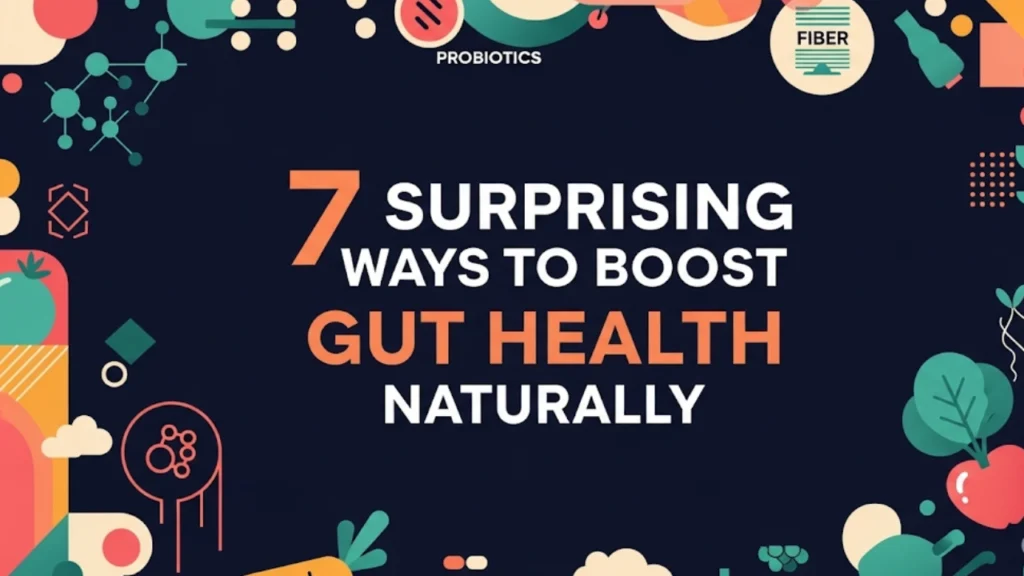Forget Expensive Probiotics? How Tiny Tweaks Became Your Gut’s Best Friend in 2025
We’ve all felt it – that post-lunch slump that feels like a lead weight in your belly, the unpredictable bloating, the energy crashes that sabotage your afternoon. For years, the gut health conversation revolved around popping pills: probiotics, prebiotics, endless supplements promising a miracle. But 2025 has ushered in a profound shift. The real revolution isn’t in the medicine cabinet; it’s woven into the fabric of our daily lives. Groundbreaking research confirms that consistent, simple, non-pharmaceutical habits are the most powerful tools we possess for cultivating a thriving gut microbiome – the foundation of vitality, immunity, and even mood. Ready to unlock effortless gut harmony? Let’s dive into the habits redefining wellness right now.
Why Your Gut Microbiome is Your 2025 MVP (More Than Ever!)
Think of your gut microbiome as a bustling metropolis teeming with trillions of bacteria, fungi, and viruses – mostly beneficial. This complex ecosystem doesn’t just digest food; it’s your frontline immune defender, a key mood regulator (producing up to 90% of your serotonin!), and a metabolic powerhouse influencing everything from weight to inflammation. The science in 2025 is crystal clear: neglect your gut residents, and you invite systemic chaos – fatigue, brain fog, skin issues, and heightened disease risk. Nurture them daily, and you build resilience from the inside out. The best part? Medicine isn’t the primary key; your daily choices are.
Habit 1: The Dawn Hydration Revolution (It’s Not Just Water Anymore)
Gone are the days of chugging plain water first thing (though hydration is still crucial!). 2025’s game-changer is intentional morning hydration designed to gently wake and prime the gut:
-
Warm Lemon & Ginger Elixir: Still a classic, but now understood on a deeper level. The warm temperature soothes the digestive tract, lemon provides a gentle acidity that stimulates bile (crucial for fat digestion), and ginger is a potent anti-inflammatory and motility aid. Tip: Use fresh ginger root, grated – its active compounds are far superior to powders.
-
Prebiotic-Infused Hydration: Look for soluble prebiotic fibers like partially hydrolyzed guar gum (PHGG) or acacia powder easily stirred into your morning water. These fibers bypass early digestion, reaching your large intestine intact to become fuel for your good bacteria. No bloat, just microbial breakfast!
-
The 30-Minute Pause: The biggest shift? Waiting at least 30 minutes after your hydrating elixir before consuming anything else (especially coffee!). This gives your gut a chance to “reset” and prepare for the day without being immediately bombarded.
Habit 2: Mindful Eating: The Anti-Stress Superpower for Digestion
Stress is public enemy number one for your gut in 2025. When you’re stressed, digestion literally shuts down – blood flow diverts away, enzyme production drops, gut motility slows. Mindful eating is no longer a luxury; it’s gut survival:
-
Activate the Vagus Nerve: Before your first bite, take 3 deep, slow belly breaths. This simple act signals your nervous system to shift into “rest and digest” mode via the vagus nerve.
-
The 20-Minute Minimum: Aim to take at least 20 minutes for a meal. Put down your phone. Chew thoroughly (aim for 20-30 chews per bite!). This allows saliva enzymes to start breaking down food properly and gives your brain time to register fullness signals from your gut hormones (like leptin).
-
Sensory Engagement: Notice the colors, smells, textures, and flavors. This isn’t just pleasant; it physiologically triggers the cephalic phase of digestion, getting stomach acid and enzymes ready before food arrives.
Habit 3: Diversity on Your Plate: Feed the Microbes, Starve the Blues
Forget rigid “gut health diets.” The single most crucial dietary factor in 2025 is diversity – specifically, plant diversity. Research confirms that individuals consuming 30+ different plant types weekly have significantly healthier, more resilient microbiomes than those stuck in dietary ruts.
-
The “Plant Points” Challenge: Don’t count calories; count plant varieties! Fruits, vegetables, whole grains, legumes, nuts, seeds, herbs, and spices all count. Aim for at least 5 different colors/types per meal.
-
Embrace Fermented Foods (Smartly): While kimchi, sauerkraut (raw/unpasteurized!), kefir, and kombucha remain stars, 2025 emphasizes regularity over quantity. A small daily serving (2-4 tbsp) provides a consistent influx of diverse live microbes. Crucially: Choose products stored in the fridge with live cultures listed.
-
Prebiotic Powerhouses Are Non-Negotiable: These are the food for your good bacteria. Prioritize daily intake of:
-
Garlic, onions, leeks
-
Asparagus, Jerusalem artichokes
-
Oats, barley
-
Apples (with skin!), bananas (slightly green)
-
Flaxseeds, chia seeds
-
2025 Spotlight: Chicory root fiber (inulin) is increasingly added to gut-friendly products, but whole food sources are always best first.
-
Habit 4: Move Your Body, Move Your Gut (Gentle is Key!)
Intense workouts can sometimes stress the gut. 2025 focuses on consistent, moderate movement that enhances gut motility and reduces inflammation:
-
Daily Walking Wins: Aim for 30-45 minutes of brisk walking most days. The rhythmic motion is incredibly soothing and stimulating for the digestive tract.
-
Yoga & Tai Chi for Gut Harmony: Poses like gentle twists (Supine Twist, Seated Twist) and forward folds (Child’s Pose, Seated Forward Bend) physically massage abdominal organs and promote peristalsis (the wave-like movements of digestion). The stress-reduction aspect is a major bonus.
-
Core Engagement (The Gentle Way): Simple exercises like diaphragmatic breathing (“belly breathing”) and pelvic floor awareness strengthen the core muscles supporting optimal digestion without strain.
Habit 5: Prioritize Sleep Like Your Gut Depends On It (Because It Does!)
The gut microbiome has its own circadian rhythm! Disrupted sleep patterns (common in our 24/7 world) directly harm microbial diversity and gut barrier function:
-
Consistency is King: Going to bed and waking up within the same 1-hour window, even on weekends, is more important than ever for gut health synchronization.
-
The 2-Hour Digital Sunset: Blue light from screens suppresses melatonin, disrupting sleep and gut rhythms. Power down phones, tablets, and laptops at least 2 hours before bed. Opt for dim, warm lighting.
-
Mind the Late-Night Snack: Eating within 2-3 hours of bedtime forces your gut to work overnight, disrupting its natural rest and repair cycle and impacting microbiome health. Allow a proper fasting window.
Habit 6: Leverage 2025’s Gut Tech (Wisely!)
Technology isn’t replacing habits; it’s enhancing our understanding:
-
At-Home Microbiome Snapshots: Affordable, user-friendly testing kits (like those from Viome or ZOE, constantly evolving) provide insights into your unique microbial landscape. Use them as a guide, not gospel, alongside professional advice.
-
AI-Powered Food Journals: Apps now go beyond calorie counting, using AI to suggest potential food triggers and microbiome-supporting choices based on your logs and symptoms. (Look for apps prioritizing data privacy!).
-
Hydration & Sleep Trackers: Wearables providing detailed sleep stage analysis and hydration reminders offer concrete data to optimize Habits 1 and 5.
The Takeaway: Consistency Over Perfection in 2025
Building a truly healthy gut isn’t about drastic overhauls or expensive supplements. The 2025 approach is elegantly simple: integrate these small, science-backed, non-medical habits consistently into your daily rhythm. Start with just one or two that resonate most – perhaps mindful eating and increasing your plant diversity. Be patient. Your microbiome didn’t develop overnight, and healing it takes consistent nurturing. Listen to your body’s signals; it’s your most valuable biofeedback tool. By embracing these daily practices, you’re not just soothing your stomach; you’re investing in your long-term energy, immunity, mood, and overall resilience. Ditch the pill-first mentality and empower your gut – and yourself – with the power of sustainable daily habits. Your thriving microbiome will thank you!
Also Read:


